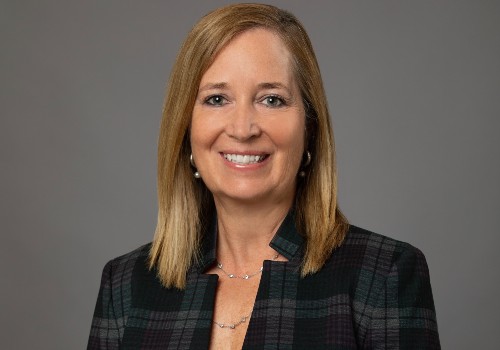Voice-enabled technology supports residents' independence and connects them with caregivers.
A senior care facility owned by one of the largest health systems in the country is deploying voice-activated "digital concierges" to bring together residents, their care teams, and loved ones to improve their quality of life and health.
The Gardens at St. Elizabeth, a Denver, Colorado-based CHI Living Community and division of CommonSpirit Health, is using Serenity, a network platform based in part on Amazon Echo Show devices, to reduce the burden on staff and empower residents to receive timelier updates on their health and living situation.
Overseeing this effort is Jane Woloson, executive director of The Gardens at St. Elizabeth.
"Serenity is an essential part of our communication by helping support independence for our residents, connecting our internal and extended care teams, and giving families more peace of mind that their loved ones are receiving the excellent care we are known for," she says. "Each day, we see the powerful impact this solution has on our residents and our community."
With her professional roots in the hospitality industry, Woloson sees similarities between running hotels and senior living communities. Since 2008, these communities have been more focused on the clinical aspects of the business, she notes.

Jane Woloson, executive director of The Gardens at St. Elizabeth, part of the CommonSpirit Health network. Photo courtesy The Gardens at St. Elizabeth.
The Gardens at St. Elizabeth features 132 independent living apartments and 57 assisted living apartments, with another 12 assisted living apartments and 36 memory care apartments opening within a month. The building has a long history, containing a 125-year-old chapel, and serving originally as a tuberculosis sanitorium and, later, an orphanage. It became an assisted living facility 40 years ago.
"One of my personal philosophies is to support independence," Woloson says. "If we can set residents up or give them the tools to be as independent as possible, I think we're moving in a successful direction."
Each participating room is equipped with an Alexa smart device. Residents can ask and receive voice-enabled answers to common questions, such as the day's lunch menu, or activities, and they can summon staff. Front desk personnel can communicate via the device to let residents know when a package is waiting for them. Residents will also be able to sign up for activities such as beauty appointments and transportation.
On the clinical side, Woloson says, these devices can help implement care plans for residents. Rounding physicians, hospice, home care, pharmacy, home health, and other providers are able to participate on the platform with patients.
"It saves a lot of phone calls to the front desk," she says. "Patients are not relying on someone else. Maybe they have failing eyesight, and they can't see the daily menu themselves."
The Serenity Connect platform and accompanying app, and its secure messaging, are HIPAA compliant, and also allow authorized family members to keep tabs on the resident's communications via the Alexa devices. These family members also have a direct line to key staff at the facility.
"Our nursing staff are getting instantaneous information," Woloson says. "Nurses can look at the app and have a great pulse on exactly what's happening with each individual resident's care."
A corporate leadership group at The Gardens at St. Elizabeth worked with corporate attorneys and the IT department to select and deploy the technology, initially as a pilot project. If residents ask the Alexa device something that would go against HIPAA guidelines, the device responds that it cannot answer that question, Woloson says.
"There's a false perception that senior citizens have no interest or bandwidth to work with such devices," she says. "That's not the case. The feedback from residents has been extremely positive. The data says they're using it, on average, four times a day. I think that's fantastic."
A study performed by Serenity and The Gardens at St. Elizabeth found that the platform saves five to 10 hours per week per key staff member at the facility. In addition, the platform reduces resident isolation and loneliness.
The Gardens at St. Elizabeth deployed the platform during the pandemic.
"It was a great time to do it, because of the importance of communication," Woloson says.
The platform has also become a selling point for the facility, as prospective residents and their families shop around for assisted living. So far, the platform has led to three new waitlist sign-ups and two new move-ins, she says.
Prospective residents who may be on a waitlist will soon be able to begin participating in the Serenity platform before moving in, providing a new kind of onboarding, Woloson says.
"At the time that Serenity Connect was introduced to us, I jumped all over it as something I wanted to participate in," she says.
“If we can set residents up or give them the tools to be as independent as possible, I think we're moving in a successful direction.”
— Jane Woloson, executive director, The Gardens at St. Elizabeth.
Scott Mace is a contributing writer for HealthLeaders.
KEY TAKEAWAYS
Residents can check on daily activities and feel less isolated, while clinicians can tailor each device to that resident's care plan.
Family members can use the devices as a form of communication and to receive updates on the resident's status and activities.
The platform saves facility staff from five to 10 hours per week, and has become a selling point for the facility when attracting new residents.
